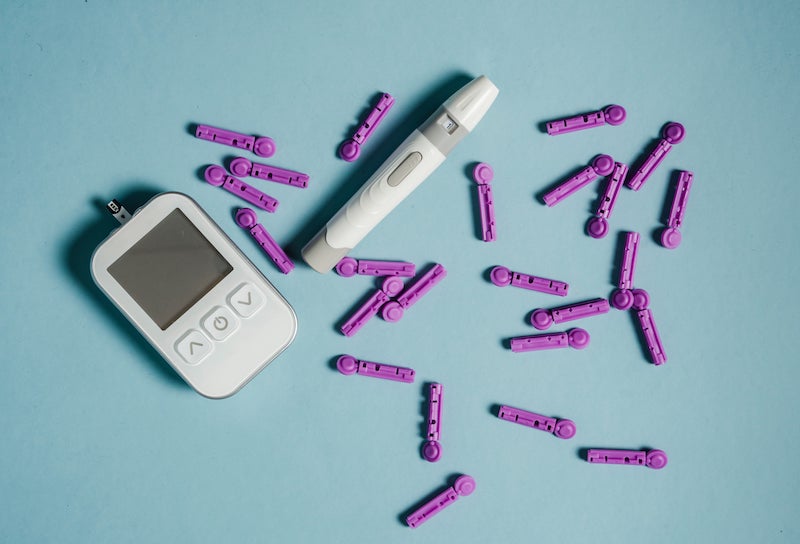The healthy bacterial cells that live in our gut are expert multitaskers. They bolster our immune system, support mental health, and even maintain clear skin! Is it any surprise, then, that they contribute to our body’s blood sugar metabolism and help prevent and manage diabetes? In this article, we’ll dive into:
- The link between diabetes and gut health
- How does poor gut health make diabetes worse?
- Are Type 1, Type 2, & Gestational diabetes all linked to gut health and the microbiome?
- How to cure diabetes with a proper gut health diet
- 3 studies that link gut health to diabetes
According to the 2020 National Diabetes Statistics Report , 34.2 million people in the United States have diabetes. If that’s not scary enough, 88 million people over the age of 18 have prediabetes. You can do the math- that’s almost half the population of the USA!.
This report makes a few things clear. First, you or someone you know likely has a diabetes-related diagnosis. Second, as a population, we’re not doing a great job at preventing disease. At Betr Health, we think there’s a better way to prevent and manage the symptoms of diabetes – a healthy gut.
How does this relationship work? Read on to find out.
The link between diabetes and gut health
Before we can understand how diabetes and gut health are related, we need a quick explanation of how diabetes works. When the body is functioning correctly, the sugar (carbohydrates) we eat triggers insulin release by our pancreas. This insulin helps our cells to use this sugar effectively and store the leftovers.
Our gut bacteria help prevent diabetes and manage existing symptoms in two ways:
- Manage the hormones responsible for insulin function and production
- Fight inflammation.
When our gut bacteria are functioning correctly, they produce short-chain fatty acids (SCFAs). SCFAs are the first step in the “assembly line” of hormone production. They are necessary to produce several hormones that improve our body’s response to blood sugar and the effects of insulin.
SCFAs also have significant anti-inflammatory effects. Inflammation, especially chronic inflammation, interferes with the function of whatever part of the body is inflamed. Anti-inflammatory SCFAs keep the cells in our pancreas (which produces and releases insulin) and the rest of our body (which process blood sugar) functioning effectively.
But what happens when the SCFA “assembly line” breaks down?
The Takeaway: Our gut bacteria produce short-chain fatty acids (SCFAs). These anti-inflammatory substances help the cells in our body respond to insulin and process blood sugar.
How does poor gut health make diabetes worse?
Short-chain fatty acids belong to a group of substances known as metabolites. Metabolites are the substances produced when our gut bacteria break down nutrients. Not all metabolites are created equal, and some are downright bad news.
Like a car, for our gut to stay healthy, it needs quality parts (diverse species of beneficial bacteria) and the right fuel (a high-fiber, plant-based diet). Without these two ingredients, we’re headed for a breakdown.
According to the research, the number and type of gut bacteria directly influence the production of SCFAs. If diet or disease disrupts the number of species of bacteria in the gut, it results in fewer SCFAs. Less SCFAs will result in an inadequate insulin response (called insulin resistance) and a greater chance of developing or worsening symptoms of diabetes.
If our diet is the fuel we put into the “car” of our body, a high-fiber, plant-based diet is premium gasoline. The typical Western diet is like an old can of gas sitting in the back of your garage. It will keep the car moving…for now. Our gut bacteria need fuel in the form of fiber. If it doesn’t get this fuel, it will not only produce less SCFAs but will end up producing harmful metabolites. On top of the lowered level of SCFAs, these metabolites result in an increase in inflammation all over the body.
This inflammation is especially bad for the disease process of diabetes. Inflammation in the pancreas leads to less insulin production and release, and inflammation in other cells leads to less insulin response and inefficient use of blood sugar. When blood sugar isn’t processed correctly, it results in more inflammation, and the unhealthy cycle continues.
Takeaway
An unhealthy gut contributes to the development of diabetes through decreased production of short-chain fatty acids and widespread, chronic inflammation.
Are Type 1, Type 2, & Gestational diabetes all linked to gut health and the microbiome?
Diabetes interferes with the processing of blood sugar. The different types of diabetes are distinct in what causes them and which part of the process isn’t working correctly. Check out the table below for a simple summary of the most common types of diabetes.
| Type | Origin | Effects | Result |
| Type 1 Diabetes(DM1) | autoimmune | Pancreas doesn’t produce insulin | Constant insulin supplementation High risk of life-threatening low blood sugar |
| Type 2 Diabetes (DM2) | lifestyle | Cells don’t respond to insulin Pancreas stops producing insulin | Chronic high blood sugar Excess blood sugar stored as fat |
| Gestational Diabetes (GDM) | pregnancy | Pregnancy hormones interfere with insulin response | High blood sugar during pregnancy |
It’s worth pointing out that each type of diabetes may also have a genetic component, which makes a person more susceptible to developing the disease under certain circumstances. But, if genetics is involved in different ways each type develops, can gut health impact all types of diabetes? Gut health can indeed have a more direct effect on some varieties than others. However, good gut health can still have an impact on the symptom severity and progression of diabetes.
Gut Health and Type 2 Diabetes
The most common form of diabetes is Type 2 (DM2), accounting for approximately 90% of diagnoses. DM2 is the type most commonly associated with an unhealthy lifestyle. The major contributors are a sedentary lifestyle combined with a poor diet (high fat, high sugar, low fiber). Sticking with the car metaphor, this type of diabetes is comparable to putting too many hard miles on your ride.
Constant exposure to high blood sugar levels makes our cells insulin resistant, so our pancreas has to produce more. Eventually, our pancreas works so hard that it breaks down and stops producing and releasing insulin. The treatment for DM2 is usually insulin injections and other medications.
However, the good news about Type 2 Diabetes is that it’s very responsive to improvements in your gut health. If you implement lifestyle interventions like an improved diet and increased exercise early, it’s possible to reverse or stop the development of diabetes altogether.
One of the critical lifestyle interventions for DM2 is adopting a high-fiber, whole food diet. This diet provides healthy gut bacteria with the fuel they need to produce plenty of short-chain fatty acids, which help control cravings, regulate blood sugar, and reduce inflammation.
Gut Health and Gestational Diabetes
Pregnancy is super cool, but any pregnant woman will tell you that it’s also super rough on the mom’s body. This is because, for 9 months, all of mom’s energy is directed at making sure that her growing baby gets everything it needs. Sometimes at mom’s expense.
Gestational Diabetes Mellitus (GDM) is one way a mom’s body pays for a growing baby. GDM looks a lot like Type 2 Diabetes, with high blood sugar readings and insulin resistance. The significant difference is that it is associated with pregnancy.
There’s still some debate over whether gestational diabetes is related to gut health. However, there is evidence that the same factors that make you susceptible to developing DM2 (obesity and poor diet) can contribute to GDM. It’s also known that somewhere between 20-50% of women with GDM develop DM2.
Because of the possible similarities and links between gestational and type 2 diabetes, it’s a fair guess that gut health can make a difference. Fostering a diverse community of beneficial bacteria species and supporting them with good nutrition will lead to the same anti-inflammatory and anti-diabetic effects.
At Betr, we’ve seen just how significant gut health’s effects on pregnancy can be. One of our members, Carolyn, was able to get pregnant after YEARS of trying. This is how impactful gut health can be on pregnancy.
Gut Health and Type 1 Diabetes
Type 1 diabetes (DM1) is the least understood and most devastating of the diabetes variants. It’s caused by the inability of the pancreas to produce insulin. A few theories on why DM1 occurs include genetic causes, an infection or viral exposure in the womb, or autoimmune disorders.
People diagnosed with DM1 require lifelong external insulin supplementation to keep their blood sugar in check. Because this type of diabetes affects such a fundamental element of the blood sugar processing system, gut health changes are unlikely to affect disease progression directly.
However, that doesn’t mean that maintaining gut health doesn’t matter for those individuals with DM1. A diverse community of beneficial bacteria will still produce short-chain fatty acids to support cellular insulin response. The anti-inflammatory effects of those SCFAs can also help support overall health and prevent the worsening of DM1 symptoms.
How to cure diabetes with a proper gut health diet
Diabetes, especially Type 2 and Gestational Diabetes, are primarily diseases of nutrition. That’s why one of the best ways to prevent the disease and improve its symptoms is by fueling your body with healthy food.
BH Method
At Betr, we believe that food is medicine. The cornerstone of our method is based on removing the harmful foods that can cause inflammation and disease. Once these unhealthy foods are removed and replaced with simple, healthy foods, your body is essentially able to health itself.
Our personalized nutrition plan is based on 3 principles:
- Healthy food can heal a damaged gut environment.
- A healthy gut environment combined with a nutritious eating program can reduce harmful inflammation and prevent chronic disease.
- There is no one size fits all for gut health because
As we’ve already discussed, the Western Diet, full of unhealthy carbs, high in fat, and riddled with non-nutritious dietary additives, is poor fuel for our microbiota. When fed on this unhealthy diet, bacteria in our gut shift towards more unhealthy species. These harmful species produce inflammatory metabolites that can interfere with our insulin production and response.
When we feed our body with a plant-based, high-fiber diet, it fuels the healthy species of bacteria. These are the bacteria that produce the healthy short-chain fatty acids that improve insulin response and reduce inflammation. More SCFAs = reduced inflammation and improved insulin response = decreased blood sugar and symptoms of diabetes.
Fermented foods can help manage diabetes.
Fermented foods are a nutritious way to add flavor and variety to your diet. In addition to their taste, they are packed with probiotic bacteria and prebiotics, which are substances that encourage the flourishing of beneficial bacteria in your gut.
- Vinegar – vinegar is a great way to add flavor to food without increasing the salt, sugar, or calorie content. One study even found vinegar can increase your cell’s insulin response. For an additional gut-healthy boost, consider purchasing organic vinegar, which contains “The Mother.” “The Mother” is a collection of substances that can feed the healthy bacteria in your gut.
- Sauerkraut – even though it’s often associated with high-fat, high-salt meats like sausage and hotdogs, sauerkraut is an excellent way to add some “zing” to lean meats. It also provides a ton of fiber to fuel healthy gut bacteria to keep churning out those short-chain fatty acids!
- Kombucha – this is an excellent option if you struggle to avoid soda! Kombucha is a fermented product that contains beneficial bacterial strains and gives you that “fizzy feeling” like soda. It’s essential, though, to go for organic, low-sugar options, as some kombucha can have a lot of added sugar to improve the taste.
Other foods that can help manage diabetes.
This section might cause some deja vu. That’s because we’ve covered most of it in our description of the Betr Health Method. Several foods recommended by the American Diabetes Association are the same foods that you’ll find recommended by Betr. Fruits, non-starchy vegetables, lean proteins, and healthy fats are the building blocks of a beneficial eating strategy.
A few specific examples include:
- Beans – Fiber? Check! Plant-based protein? Check! Low fat, packed with vitamins and minerals? Check, check, and check! These are just a few of the reasons that the American Diabetes Association considers beans a “diabetic superfood.”
- Dark, leafy greens – Spinach and Kale get a bad rap. They provide plenty of gut-healthy fiber to feed our flora for almost no calories. In addition to this, they provide Vitamins A, C, E, and K, Iron, Calcium, and potassium.
- Sweet Potatoes – need something a little bit sweet and starchy? Sweet potatoes provide plenty of fiber and have a better effect on your blood sugar than regular white potatoes.
- Nuts – you don’t want to go overboard. Still, nuts are an excellent option for a compact snack that provides fiber and healthy omega-3 fatty acids.
- Fatty Fish – at first glance, this looks wrong. Too much fat is bad, right? Only if it’s the wrong kind. Choose tuna, salmon, or trout for an omega-3 containing fish. These healthy fats reduce the risk of heart disease and inflammation.
Find Your Healthy Weight
At Betr Health, we don’t believe that there is any one “healthy weight.” However, many of our members report finding the right weight for their bodies when they adopt our program. Excess fat stores can lead to insulin resistance, inflammation, and sedentary behavior. All of these effects are associated with an increased risk of developing diabetes.
Get Moving!
Exercise does double duty against diabetes. Not only does it reduce inflammation, but activity improves the health and diversity of our gut bacteria! You don’t have to be a “gym rat” to benefit from exercise. Taking the dog for a walk, riding your bike, or a fun workout video all count as beneficial exercise!
3 studies that link gut health to diabetes
Even though there’s still a lot to learn, we know more today than we’ve ever known about the relationship between gut health and diabetes. Because diabetes is such a significant public health concern, more and more research is being directed towards addressing the development and treatment of the disease. Below are just a few studies that have made some significant observations on the link between gut health and diabetes.
The Role of Gut Microbiota in Diabetes Type 2 Pathophysiology
Pathophysi-wha…? “Pathophysiology” means the nuts and bolts of how a disease affects the body. This study goes into great depth about the relationship between gut bacteria and Type 2 Diabetes. A few things they discuss:
- Certain species of bacteria can protect against the development of DM2 while other species can contribute to its development. How did they figure this out? They reviewed information from 42 different studies on humans and identified the common bacteria present in individuals with DM2.
- Researchers identified four key ways that gut bacteria can contribute to diabetes (they’ll sound familiar). Gut bacteria affect inflammation, cellular response to insulin, gut wall permeability (how well your digestive system does at keeping bad things out and good stuff in), and fat metabolism.
This study covers it all if you want to “nerd out” on the effect of gut health on diabetes.
Understanding the Role of the Gut Ecosystem in Diabetes Mellitus
This study covers a lot of the same ground as the first one we recommended. One area where it goes into really interesting detail is the role of gut health on short-chain fatty acids. If SCFAs are your gut-health heroes, this study also discusses the various ways that gut bacteria produced SCFAs can contribute to the body’s insulin response.
Microbiome Signatures of Nutrients, Foods and Dietary Patterns: Potential for Personalized Nutrition from The PREDICT 1 Study
The PREDICT 1 Study pretty much says it all. In this study, researchers evaluated the diets of 1100 individuals and compared those individuals microbiome, diet, and development of chronic disease. It shouldn’t surprise you that they found a significant relationship between a high-fiber, plant-based diet, a healthy gut microbiota, and the development of several common chronic diseases.
In this article we’ve discussed:
- The role of gut microbiota on inflammation and how our body processes sugar
- How an unhealthy gut can contribute to the development and severity of the different types of diabetes
- Approaches to fighting the development and symptoms of diabetes
- Research analyzing how gut health and diabetes are related
If there’s one major takeaway from this discussion, it’s this: if you are diabetic or at risk of developing diabetes, there are healthy steps that you can take. At Betr Health, our method is based on showing you healthy, sustainable ways to address ongoing chronic health challenges and to maximize your health and happiness.
After reading this article, you may be asking yourself if your own health hurdles could be related to an unhealthy gut.
Explore Betr's risk-free trial to see if you could benefit from using food as medicine to rebuild your microbiome and realize the healthy potential you never knew you were missing!











